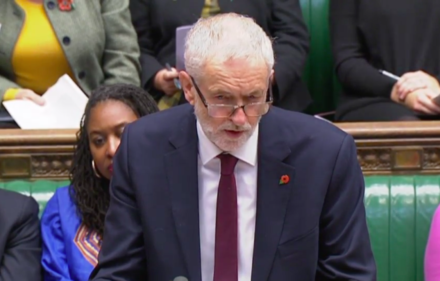
“If I were a prison governor, a local authority chief executive or a headteacher, I would struggle to find much to celebrate. I would be preparing for more difficult years ahead,” Jeremy Corbyn quoted. “Does the Prime Minister think that analysis is wrong?” he asked. Last week, it was the Tory council leader in Walsall, this afternoon it was the Institute for Fiscal Studies. Again at PMQs, this time to slam the autumn budget, the Labour leader used the neat trick of citing damning indictments of her government’s policies from people who cannot be dismissed by Theresa May.
Ignoring the IFS quote, the Prime Minister pointed to extra funding for schools and prisons and repeated her claim that “austerity is indeed ending”. Then, curiously, she sought to establish her own definition of the end of austerity. “What does that mean? Ending austerity is about continuing to bring debt down and put more into our public services.” She added, in a postscript that explains her switch from ‘austerity is over’ to ‘austerity is ending’: “And we’ll set out our further details in the spending review.”
And yet non-protected departments face real terms cuts of £4.1bn. This was a “broken promise budget – and she knows it”, Corbyn says, setting the theme for his questions to the Prime Minister today. The Police Federation are being held in “contempt” by the government”, the Labour leader presses on, plus school funding has been cut and they were given only enough for “little extras” to use Philip Hammond’s own words. In response, May pulls out her tired old lines, now regularly being repeated ad infinitum at PMQs: “We’re taking the country forward. What would he do? His policy would mean borrowing more, taxing more and wasting more and taking us back to square one.”
In a move that surprised political journalists (“Clown,” tweeted The Sun‘s Steve Hawkes), Corbyn chose to bring up the Tory tax cuts himself – despite them currently being a source of tension within the parliamentary Labour party. After John McDonnell confirmed that Labour wouldn’t vote down the personal allowance and higher-rate threshold increases, Andy Burnham said the position “sent shivers down my spine” and compared it to Harriet Harman’s infamous Welfare Reform Bill decision. On LabourList today, backbencher Lisa Nandy writes that backing the tax cuts is “plain wrong”.
But the Prime Minister would surely have raised the row at some point in the session. By bringing it up himself, Corbyn may have taken the sting out of an attack that could have come too late for him to reply. Instead, he got the chance to highlight that Labour would raise taxes for the top 5% as well as corporations, and confirm that his party would end the benefit freeze – a policy controversially not included in the 2017 manifesto.
Theresa May appeared more confident than she has been in recent weeks, but incessant heckling by her Tory MPs (also cheered by the budget) gave a terrible impression that only served to help Corbyn. The Prime Minister had her backbenches join in her conclusion – “support for public services up, growth up, wages up” – but Labour can easily hit back: foodbank use up, homelessness up, child poverty up, NHS waiting times up, crime up, in-work poverty up.




More from LabourList
‘Labour council candidates – it’s tough, but all is not lost’
‘Labour won’t stop the far right by changing leaders — only by proving what the left can deliver’
‘Cutting Welsh university funding would be economic vandalism, not reform’